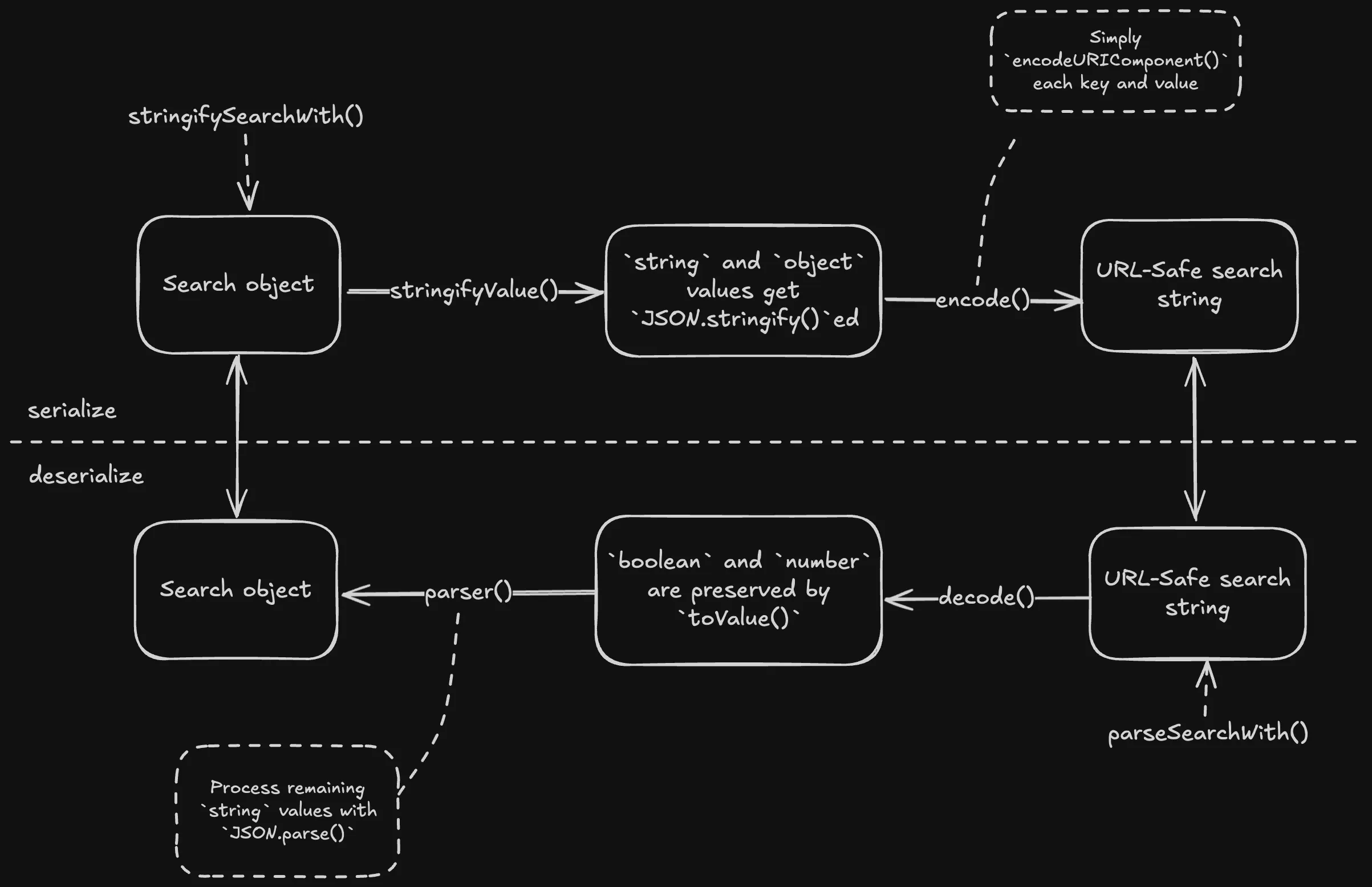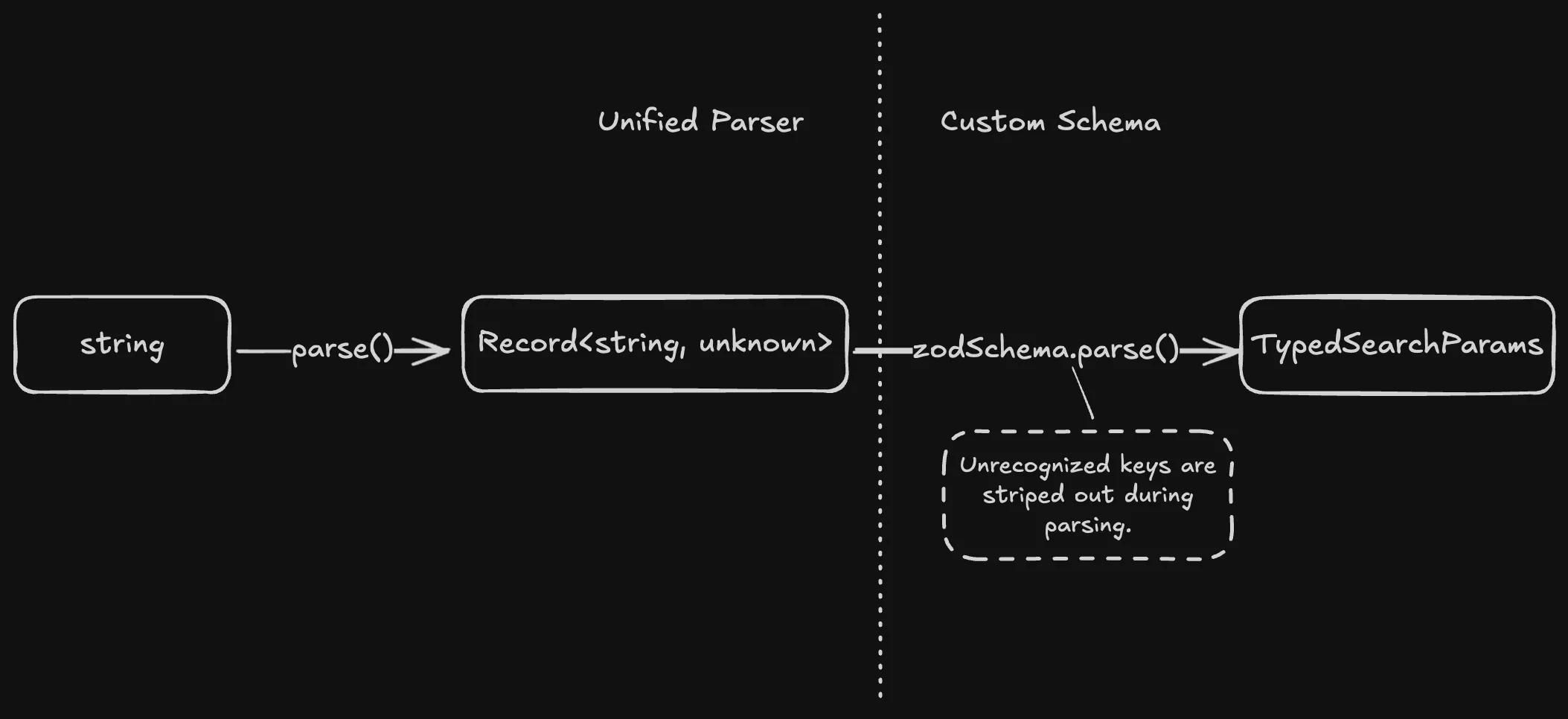如何剽窃 Tanstack Router 的 Search Params API
本文行文风格极大程度上受《如何带着三文鱼旅行》的影响,尽管是坏的意义上。
梦开始的地方
在我还年少无知、初入 Web 开发世界并以为这是一项妙趣横生的工作时,我就不可一世地认为,URL 是储存页面状态的一个绝佳场所。我的论据很简单,从 URL 读取状态并同步 UI 真是一条简洁的 Data Flow,作为这条链路的 Single Source of Truth,URL 的可访问性很符合 Web 无状态的服务本质。理论上,单单一条处理得当的 URL 就能反映 90% 的页面内容(不管是作为隐喻面对用户,还是针对你吞吐量岌岌可危的服务)。
为了实践这高贵的理念,我已经不知好歹地在好几个工作上的 feature 中落地了尊崇 Search Params 的模式,这些可怜的 feature 断断续续、非正态地分布在估值一年的时间长河中,时至今日依然揣着它们脆弱的 De/Serializer 牌拐杖维持那份表面的优雅。是的,又一桩“use the platform”悲剧,让我们默哀三秒,然后踏入这场剽窃之旅。
TL;DR: Code
一桩事先张扬的剽窃
如果你没有看明白上面自作聪明的揶揄,别担心,我从亲爱的 TanStack Router 那找到了一份解释:
- Search params represent application state, so inevitably, we will expect them to have the same DX associated with other state managers. This means having the capability of distinguishing between primitive value types and efficiently storing and manipulating complex data structures like nested arrays and objects.
- There are many ways to serialize and deserialize state with different tradeoffs. You should be able to choose the best one for your application or at the very least get a better default than
URLSearchParams.- …
谢谢你,Tanner Linsley!以及你的 MIT 协议,允许我毫无顾忌(和尊严)地引用你的只言片语,以应付那些来自沙文、社会达尔文、优绩主义、imposter syndrome 患者和我脑海的质疑。这篇剽窃向你致敬。
美丽新世界
我们(以 Tanner Linsley 之名)引入了一套全新的序列化解决方案,它在 JavaScript 世界无所不包,能够(几乎)完备地处理你的任何需求,最神秘的是你无法在 npm 上找到它的正式发行版本——没错,它就是崭新的 JSON.stringify 和 JSON.parse。
Tanstack Router 英明地引入了其对 Search Params 的序列/反序列化问题的 assumption:
- The first level of the search params is flat and string based, just like
URLSearchParams.- First level values that are not strings are accurately preserved as actual numbers and booleans.
- Nested data structures are automatically converted to URL-safe JSON strings.
拉稀的序列化
这套设计在 router/packages/react-router/src/searchParams.ts at main · TanStack/router 中被实现,以便于为我们这些剽窃者所用,并肆意评头论足:
/**
* The serializer factory.
* @param stringify The custom serializer used to stringify
* all values in the search params object.
* @param search The search params object.
* @returns The ULTIMATE serializer.
*/
export function stringifySearchWith(
stringify: (search: any) => string,
parser?: (str: string) => any,
) {
function stringifyValue(val: any): string {
/**
* Stringify all non-null objects!
*/
if (typeof val === 'object' && val !== null) {
try {
return stringify(val)
} catch (err) {
// silent
}
} else if (typeof val === 'string' && typeof parser === 'function') {
try {
// Check if it's a valid parsable string.
// If it is, then stringify it again.
// Me: Wait, but why?
// Saint Tanner: RTFM.
// Me: Okay, so this extra process on `string` is for
// `boolean` and `number` preservation, right?
// Saint Tanner: Yeah, you're getting there.
parser(val)
return stringify(val)
} catch (err) {
// silent
}
}
// Look, `number` and `boolean` didn't get passed to `stringify()`!
return val
}
// Yes, our ULTIMATE serializer takes any kind of search object,
// while it, still, needs to be an object.
return (search: Record<string, any>) => {
// Spread the search object to execute an implicit iteration,
// ensuring the output is key-iterable.
// Me: Wait, isn't this a bit too much? What about side effects?
search = { ...search }
// Beautiful FP.
Object.keys(search).forEach((key) => {
const val = search[key]
// Get outta here, `undefined` value!
if (typeof val === 'undefined' || val === undefined) {
delete search[key]
} else {
// Did you see? Everything except `undefined` gets stringified.
search[key] = stringifyValue(val)
}
})
// Finally, encode the output string with our Tanstack level `encode()`,
// which is borrowed from the dear `qss` package.
const searchStr = encode(search as Record<string, string>).toString()
return searchStr ? `?${searchStr}` : ''
}
}上面这段短小精悍的 snippet 为我们揭示了 Tanstack Router Search Params API 强大秘密的一角,并且部分实现了我们所提到 assumption 的第一条:
The first level of the search params is flat and string based, just like
URLSearchParams.
正是 Object.keys(search).forEach(/*...*/) 这一入口,导向了我们平铺(在顶层上)直叙(毫无吸引力的字符串)的 search string 造物。无论什么样的输入,在 Object.keys(search).forEach(/*...*/) 这一关,都会被扁平化为一层结构体,以便后续的编码处理。
另外,你可能注意到了 encode() 这个机械降神的函数,它由先知 Tanstack Router 从 qss 中汲取而来,以为将 search object 转化为 URL-safe string 这条 hot path 极致赋能。router/packages/react-router/src/qss.ts at main · TanStack/router 中记录了其具体的实现:
/**
* Encodes an object into a query string.
* @param obj - The object to encode into a query string.
* @param [pfx] - An optional prefix to add before the query string.
* @returns The encoded query string.
* @example
* ```
* // Example input: encode({ token: 'foo', key: 'value' })
* // Expected output: "token=foo&key=value"
* ```
*/
export function encode(obj: any, pfx?: string) {
let k,
i,
tmp,
str = ''
for (k in obj) {
if ((tmp = obj[k]) !== void 0) {
if (Array.isArray(tmp)) {
for (i = 0; i < tmp.length; i++) {
str && (str += '&')
str += encodeURIComponent(k) + '=' + encodeURIComponent(tmp[i])
}
} else {
str && (str += '&')
str += encodeURIComponent(k) + '=' + encodeURIComponent(tmp)
}
}
}
return (pfx || '') + str
}这是一段简单的代码,而其易读性却不简单。在接收一个对象 obj 和可选的前缀 pfx 后,encode() 会将 obj 中的每个键值对分别调用 encodeURIComponent(),需要注意的是,其中的 tmp 或者 tmp[i] 并不一定是字符串,而仍然可能是除 object 外的任意类型。是的,encodeURIComponent() 在处理非字符串时将执行 coercion。
让我们回过神来,encode() 正是负责实现上述 assumption 的第三条:
Nested data structures are automatically converted to URL-safe JSON strings.
同时,在 Tanstack Router 中,默认伴 stringifySearchWith() 同行的便是我们的 JSON.stringify(),它就是 Router 无可否认、最为正统的 THE DEFAULT serializer。
便秘的反序列化
正如序列化像是一场拉稀,将任意的输入吞吐为难辨究竟的絮状物(字符串),反序列化则是一场便秘:
parseSearchWith()- searchParams.ts#L10 · TanStack/routerdecode()- qss.ts#L66 · TanStack/router
type AnySearchSchema = {}
export function parseSearchWith(parser: (str: string) => any) {
return (searchStr: string): AnySearchSchema => {
// First remove the prefix "?"
if (searchStr.substring(0, 1) === '?') {
searchStr = searchStr.substring(1)
}
// Top-level decode
const query: Record<string, unknown> = decode(searchStr)
// Try to parse any query params that might be json
for (const key in query) {
const value = query[key]
// Hey, note this condition!
// It indicates that some values are already not `string`s, right?
// That's the magic, `number` and `boolean` are preserved!
if (typeof value === 'string') {
try {
// Just imagine the `parser` is `JSON.parse()`
query[key] = parser(value)
} catch (err) {
// silent
}
}
}
return query
}
}
/**
* Decodes a query string into an object.
* @param str - The query string to decode.
* @param [pfx] - An optional prefix to filter out from the query string.
* @returns The decoded key-value pairs in an object format.
* @example
* // Example input: decode("token=foo&key=value")
* // Expected output: { "token": "foo", "key": "value" }
*/
export function decode(str: any, pfx?: string) {
let tmp, k
const out: any = {},
/**
* The array of key-value pairs
*/
arr = (pfx ? str.substr(pfx.length) : str).split('&')
// Iterate the key-value pairs
while ((tmp = arr.shift())) {
/** Index of the equal mark of the to-be-processed key-value pair */
const equalIndex = tmp.indexOf('=')
if (equalIndex !== -1) {
k = tmp.slice(0, equalIndex)
// Decode the key
k = decodeURIComponent(k)
// The still encoded value
const value = tmp.slice(equalIndex + 1)
// The `void 0` expression is used to obtain the `undefined` primitive value
if (out[k] !== void 0) {
// This branch indicates that the key is already in the processing object,
// so we need treat it as an array.
// @ts-expect-error
out[k] = [].concat(out[k], toValue(value))
} else {
// Every `value` needs to go through the `toValue()` transformation
out[k] = toValue(value)
}
} else {
// When there's no equal mark in the key-value pair,
// we treat it as a key with an empty string as value,
// so we only decode the key here.
k = tmp
k = decodeURIComponent(k)
out[k] = ''
}
}
return out
}
/**
* Converts a `string` value to its **appropriate** type (`string`, `number`, `boolean`).
* @param mix - The `string` value to convert.
* @returns The converted value.
* @example
* // Example input: toValue("123")
* // Expected output: 123
*/
function toValue(mix: any) {
// Here we filter out the `''` value early
if (!mix) return ''
// Decode first
const str = decodeURIComponent(mix)
// Boolean
if (str === 'false') return false
if (str === 'true') return true
// Number
return +str * 0 === 0 && +str + '' === str ? +str : str
}这是一段前后联动紧密的代码,首先,parseWithSearch() 是反序列化器的工厂函数,尽管我们大可以将它视为一个自定义 parser 的 placeholder,它大放异彩的时刻可能还在未来。眼光回到现在,我们尚只需关注,在使用默认的 JSON.parse() 参数时,其返回的 parser 函数作为反序列化工程的入口,它如何工作:
- 举手之劳!去掉 search string 的前缀
?,否则将导致食物中毒; - 精密的逻辑发生在上消化道
decode()中,这位来自qss的大法官能够将encode产物正确地还原:- 相当原始地,
decode()首先将str根据分隔符&分割为各个key=value对,然后依次处理; - 对每个
key=value,decode()会首先将key使用decodeURIComponent()解码,然后将 value 传递给神奇的toValue(); toValue()名副其实,它救赎了stringifySearchWith()中对string的不公处理:它在补足对value的decodeURIComponent()后,专断地将string转化为number或boolean;
- 相当原始地,
- 下消化道则显得相当大刀阔斧,对
decode()输出的query对象中的每个string类型的value,parseWithSearch()会将其传递给 parserJSON.parse(),以期获得string或者任意复杂的结构体。
Recap
为您敬上,这是一张粗略的序列化/反序列化流程图:

相信你的输入,or not to be?
如果你不幸跟我一样,被迫得到 Search Params 的天启,而又曾被生性执拗的 URLSearchParams 所辜负,那么你一定会对自己狭隘心胸中对 TypeScript 的愚忠感到羞愧。万幸,在这个后 Zod 时代,如果我们无视引入更多碳排放的道德谴责(是的,我们始终无视),像 You-Know-Which 这样的 Runtime Validation 工具,将 Make TypeScript Great Again。
如 Validating Search Params 所揭晓的,Tanstack Router 在实际使用中对 Search Params 的解析分为两步:
- Unified Parser - 即已经在上面得到剖析的
parseSearchWith(),默认情况下,所有 Search Params 统一先接受它的解析,但不可接受的是,它返回的类型永远是Record<string, unknown>; - Custom Validation - 开发者,也就是我们,能够自定义的 Validator(例如 Zod 这样的 Schema-based Validator),以对 Search Params 进行更为精细、同时灵活的类型验证。

剽窃成果
有了以上这些条件,我们已经能够在垂垂老矣的 React Router 项目中,实现一套剽窃 Tanstack Router 的 Search Params API。
import {
useLocation,
useNavigate,
type NavigateOptions,
} from 'react-router-dom'
import { z, type ZodRawShape } from 'zod'
import { parseSearchWith, stringifySearchWith } from './wherever-you-put-them'
const defaultParseSearch = parseSearchWith(JSON.parse)
const defaultStringifySearch = stringifySearchWith(JSON.stringify)
/**
* Helper hook to use typed Search Params with Zod Schema validation.
* @param searchZodSchema - The Zod Schema for the Search Params.
* @returns Like `useState()` - a tuple of typed search params object and its setter.
*/
function _useSearchParams<Schema extends ZodRawShape>(
searchZodSchema: z.ZodObject<Schema>,
) {
const navigate = useNavigate()
/**
* Retrieve the `search` string from the hook from React Router,
* so that it aligns with the Router's lifecycle.
*/
const location = useLocation()
const search = location.search
type SearchParams = z.infer<typeof Schema>
const searchParams = useMemo<SearchParams>(() => {
// First, parse as `Record<string, unknown>`
const parsed = defaultParseSearch(search)
// Then, validated with Zod schema.
// By default unrecognized keys get stripped out here.
const validated = searchZodSchema.parse(parsed)
return validated
}, [search])
const setSearchParams = useCallback(
(nextSearchParams: SearchParams, options?: NavigateOptions) => {
const nextSearch = defaultStringifySearch(nextSearchParams)
/**
* Use `navigate()` to update search params,
* because `setParams()` from `useSearchParams()`
* does additional encoding.
* @see https://github.com/remix-run/react-router/blob/7372affd445eaa16d7866bc97ef14cb61361bff5/packages/react-router-dom/index.tsx#L1497
* @see https://github.com/remix-run/react-router/blob/main/packages/react-router-dom/dom.ts#L79
*/
return navigate(
{
search: nextSearch,
},
options,
)
},
[navigate],
)
return [searchParams, setSearchParams] as const
}
// Usage
const productSearchSchema = z.object({
page: z.number().default(1),
filter: z.string().default(''),
sort: z.enum(['newest', 'oldest', 'price']).default('newest'),
})
function useProductListSearch() {
return _useSearchParams(productSearchSchema)
}
// In your component
function ProductList() {
// Fully typed search params!
const [searchParams, setSearchParams] = useProductListSearch()
// searchParams.page
// searchParams.filter
// searchParams.sort
// ...
}